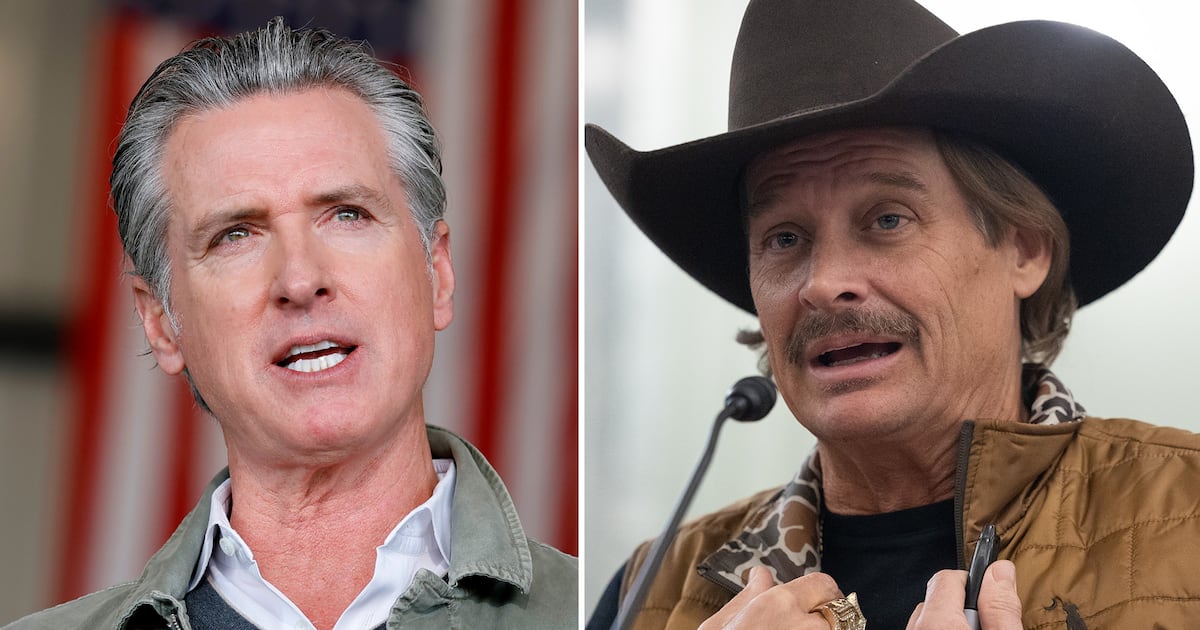The Republican primary election in Nevada is scheduled for Feb. 23, and it could be the place where two superstars in the GOP—Marco Rubio and Ted Cruz—who have been on a collision course for months, finally crash into one another.
On the one hand, Nevada remains Rubio’s best bet to chalk up a victory in one of the early primaries. That’s appropriate. The 44-year-old is the closest thing that Nevada has to a favorite son in the GOP presidential field. He spent part of his childhood there while his mother worked as a hotel maid and his father labored as a bartender.
A gifted communicator with an inspiring life story and a strong grasp on foreign policy who was not long ago viewed as nothing less the savior of the Republican Party, Rubio could easily go 0 for 3 in the initial set of contests.
Yes, anything could happen. Yet, if you trust the polls, Iowa could go to Cruz or Donald Trump, New Hampshire to Trump or Chris Christie, and South Carolina to Trump or Cruz.
If Rubio doesn’t run the board in Nevada and pull out a victory, the Florida senator would limp into the “SEC” primary on March 1—where 12 Southern states are in play for the GOP, including Texas, Colorado, Virginia, and Georgia.
And at that point, Rubio would be facing long odds against being able to resurrect his campaign, especially when you figure how well a right-wing guy like Cruz can do in the Southern states. If Rubio doesn’t pull off an upset in several states on March 1, it’ll be time to cash out his presidential bid.
Meanwhile, we can rest assured that Cruz has his own designs on Nevada. If the Texas senator takes Iowa, Trump is likely to shred the informal gentleman’s agreement between the two and let the insults fly. The businessman could finally begin to self-destruct. And, at that point, with the aura of invincibility around the billionaire pierced, and Republican voters who were drawn to Trump the Winner finding Trump the Loser much less appealing, Cruz could take South Carolina.
Going into Nevada 2 for 3, the Texas senator would be in a strong position to compete on what should be familiar ground—a wide-open Western state known for its independence, frontier spirit and distrust of Washington. And from there, into the SEC primary, Cruz just keeps getting stronger. He won’t win every contest, but he’ll win enough to claim the title that Trump now holds: “frontrunner.”
Nevada also weighs heavily in the primary process because it’ll mark the first time that Hispanics make an appearance. Making up 28 percent of the state population, and representing a sizable chunk of the electorate, this critical demographic group is more conservative than many Americans realize and have shown time and again that it is willing to roll the dice on a moderate Republican who shares its values.
Exhibit A is Nevada Gov. Brian Sandoval, a Hispanic Republican who enjoyed significant Hispanic support—winning 33 percent of the vote—when he was elected in 2010. He has become even more popular with Hispanics while serving in office.
For one thing, Sandoval supports comprehensive immigration reform, and he isn’t afraid to criticize other Republicans when they say or do something dumb about immigration—which usually occurs about every 30 minutes or so.
You’ll often hear from political observers in both parties who know a lot about politics but not much about Hispanics that these voters don’t care about immigration, certainly not as much as they do about their top three issues: jobs, education, and health care. But what these so-called experts always overlook is that, while this assessment may be true when the political waters are still, it ceases to be true when the immigration issue boils over—as it tends to do now and then.
It’s at those difficult and uncomfortable moments, when they feel under siege, that Hispanics take the measure of elected officials and assess their character. They want to know who has the integrity to defend them when things get ugly.
In May, Sandoval signed a bill to expand opportunities for DREAM’ers—undocumented immigrant young people who were brought to the United States as children. Those who already have temporary legal status under the Obama administration initiative known as Deferred Action for Childhood Arrivals, can now obtain a Nevada teaching license and work as teachers.
Clearly, Sandoval is not your father’s Republican. But, for Hispanics in Nevada, he’s been a good fit.
Here’s a secret about Hispanic voters that not many people know: They’re just waiting for Hispanic Republicans to sell them out and reveal themselves to be more Republican and less Hispanic. They expect it. At the end of the day, Hispanics want to know that an elected official is not going to sacrifice common sense, and what he believes is the right thing to do, on the altar of ambition and political expediency.
Sandoval hasn’t done that. And, in 2014, he was re-elected in a landslide with strong Hispanic support.
So, one way of looking at the Nevada Republican primary is to ask: Which one of the two bright young Hispanic Republicans vying for the presidency is more like Sandoval—Rubio or Cruz?
The off-the-cuff answer would seem to be Rubio, and that could well give him an edge in Nevada, especially if Sandoval offers an endorsement. That’s a real possibility for Rubio.
And it’s hard to imagine Sandoval endorsing Cruz. Their political philosophies seem quite different, particularly on the immigration issue.
Yes, it’s true that many on the far right think that, by co-sponsoring the Senate’s “Gang of Eight” immigration bill in 2013, Rubio made a bad choice. But, given that Cruz proposed an amendment back then that offered legal status but now claims to oppose it, his position can best be described as multiple choice.
Immigration was never going to be an easy issue for either candidate. It matters a lot to Mexican Americans, some of whom tend to resent Cuban-American senators who want to crack down on illegal immigration to keep out people from Mexico and Central America but won’t repeal the archaic 1966 Cuban Adjustment Act, which offers a magic carpet ride to citizenship for Cuban refugees who reach U.S. soil.
Still, with this issue as with most others, it’s better for candidates and elected officials to be disagreed with yet respected than to be agreed with but not trusted.
If the contest in Nevada boils down to a choice between Rubio and Cruz, we’ll see whom Hispanic voters trust more to lead—and, more importantly, whom they’re willing to follow. And that will set the tone for the rest of the election.
In most states, the back and forth is all politics. But in Nevada, for two Hispanic senators, it’s personal.





